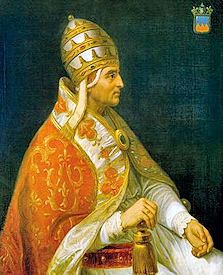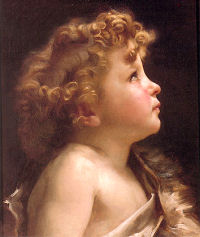Advent: December 19th
Friday of the Third Week of Advent
Other Titles: Day 3 O Antiphons: O Radix Jesse (O Root of Jesse)
» Enjoy our Liturgical Seasons series of e-books!
In the General Roman Calendar, this date is a weekday in Advent. No feast of a saint is celebrated. The readings lead us to prepare for Christmas when Christ's first coming to us is remembered and to direct our mind and heart to await Christ's Second Coming at the end of time. Advent is thus a period for devout and joyful expectation.
Today is the third of the O Antiphons, the seven jewels of our liturgy, dating back to the fourth century, one for each day until Christmas Eve. These antiphons address Christ with seven magnificent Messianic titles, based on the Old Testament prophecies and types of Christ. The Church recalls the variety of the ills of man before the coming of the Redeemer.
Pope Blessed Urban V
 Guillaume was born to the nobility, one of four children of Guillaume de Grimoard, Lord of Bellegarde, and of Amphélise de Montferrand; his brother later became a cardinal and papal legate. Guillaume became a Benedictine monk at the priory of Chirac, France in 1327. He was a priest, ordained at the Chirac monastery in 1334. He studied literature and law in Montpellier, France, and then law at the University of Toulouse, France. He received a doctorate in Canon Law on October 31, 1342, and was known as one of the most learned men of his day. Guillaume was appointed prior of Nôtre-Dame du Pré in the diocese of Auxerre, France by Pope Clement VI, then abbot of Saint-Germain en Auxerre monastery on February 13, 1352 and later was the Benedictine Procurator-General at the Papal court. He taught canon law in Montpellier, in Paris and in Avignon, France. His continued various roles: Vicar-general of the diocese of Clermont, France c.1350, the Vicar-general of the diocese of Uzès, France in 1357, papal legate in Italy several times, Abbot of the abbey of Saint Victor in Marseilles, France from August 1361 to 1362, advisor to Pope Innocent VI and Apostolic Nuncio in Italy.
Guillaume was born to the nobility, one of four children of Guillaume de Grimoard, Lord of Bellegarde, and of Amphélise de Montferrand; his brother later became a cardinal and papal legate. Guillaume became a Benedictine monk at the priory of Chirac, France in 1327. He was a priest, ordained at the Chirac monastery in 1334. He studied literature and law in Montpellier, France, and then law at the University of Toulouse, France. He received a doctorate in Canon Law on October 31, 1342, and was known as one of the most learned men of his day. Guillaume was appointed prior of Nôtre-Dame du Pré in the diocese of Auxerre, France by Pope Clement VI, then abbot of Saint-Germain en Auxerre monastery on February 13, 1352 and later was the Benedictine Procurator-General at the Papal court. He taught canon law in Montpellier, in Paris and in Avignon, France. His continued various roles: Vicar-general of the diocese of Clermont, France c.1350, the Vicar-general of the diocese of Uzès, France in 1357, papal legate in Italy several times, Abbot of the abbey of Saint Victor in Marseilles, France from August 1361 to 1362, advisor to Pope Innocent VI and Apostolic Nuncio in Italy.
Urban was sixth of the Avignon Popes; he took the name Urban saying that “all the popes who have borne this name were saints." As pope he eschewed the pomp of the throne, and continued to live by the Benedictine Rule, which led to opposition from courtiers who preferred a more regal life in court. He cut tithes in half, supported students, clerical training, seminaries and colleges, worked to re-unite Latin and Greek Christians, fought the heresies of the day, built churches and monasteries, restored many that had fallen on hard times or fallen away from discipline. He fought absentee bishops, bishops of multiple dioceses, and simony, founded a university in Hungary, restored the medical school in Montpellier, and approved the establishment of the University of Krakow. He preached crusade against the Viscontis in Italy, accusing them of theft of Church property. Preached crusade against the Turks in 1363, but little came of it as many of the leaders died of natural causes before troops could be put into the field.
Urged by Saint Bridget of Sweden and by Saint Catherine of Siena to return the papacy to Rome, he moved his court back to Rome, entering the city on October 16, 1367, the first pope to do so in 60 years. He was met by jubilant Romans and clergy. He re-discovered relics of Saint Peter and Saint Paul the Apostle in the papal chapel of the Lateran basilica when he prepared to say Mass there onMarch 1, 1368; they were later placed and new reliquaries and enshrined. However, outbreaks of plague and violence in the city led him to return to France, arriving there on September 24, 1370. He fell ill soon after, and his remaining weeks were ones of physical decline. He died on December 19, 1370 at Avignon, Papal States. He is the only Avignon pope to be beatified.
—Adapted from CatholicSaints.info
Highlights and Things to Do:
- Read more about Pope Urban V:
- Pope Urban's relics are located in the former Abbey church of Saint-Victor in Marseille, France.






